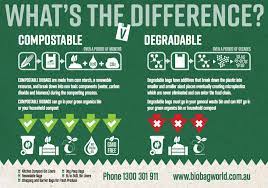Click Here to view More Content Writing Examples.
 Difference between Compostable and Biodegradable Plastic
Difference between Compostable and Biodegradable Plastic
Compostable plastic and biodegradable plastic sound similar but in fact they are some what different. First off, compostable products have the capability to be biodegradable. Secondly, not all biodegradable products have the ability to be compostable. This means they are related but different at the same time. The differences between the two have to do with their production materials, there decomposition process and the residual elements left after decomposition. We will now go through the characteristics of Compostable Plastic and Biodegradable Plastic before ending with our interesting conclusion.
Compostable Plastic
Compostable plastic degrades with time. It usually does not have any (or less) toxic elements to the environment after degradation. But compostable plastic needs a specific compostable environment to degrade. This type of plastic is made of organic elements that degrade in the environment. Compostable plastics may leave behind beneficial residual products like fertilizers and others which improve the soil health. They can be defined as anything that undergoes degradation by biological processes during composting to yield CO2, water, inorganic compounds, and other elements. 90% of compostable plastics degrade in a time period of 180 days specifically in a compost environment. Some plastic bags are made of compostable plastic. These bags can be made of natural plant starch and do not produce any toxic material. They break down readily in a composting system through microbial activity to form compost.
Biodegradable Plastic
Biodegradability is a trait of certain plastic products. Biodegradable plastic breaks down into microplastics faster than regular plastic in any conditions (compost, landfill, soil). This type of plastic can take several months to break down and recent studies suggest that some of these products leave toxic waste behind after degrading. This toxic waste is called microplastics. You cannot see these microplastics as they are micro materials that have toxic components that probably will affect our environment either now or in the distant future. But they usually take three to six months to decompose. We must realise that’s much quicker than regular plastic which takes hundreds of years. There is a type of biodegradable plastic bags for supermarket shopping. They are durable but also decompose over time.
Conclusion
We reiterate that plastics that are compostable can be biodegradable, but not every plastic that is biodegradable is compostable. Biodegradable plastic may be engineered to biodegrade in soil or water. Biodegradable plastics break down and degrade in the environment over time but the timeline maybe unknown. Compostable plastic biodegrades into soil conditioning material (i.e., compost) under a certain set of conditions. Composting utilizes microorganisms, heat and humidity to create carbon dioxide, water and inorganic compounds. Ultimately, decomposition of compostable plastic should have no impact on the ability of the finished compost to support plant growth. There are regulations with labelling a plastic biodegradable or compostable and we hope that plastic producers remain honest. Finally, we must acknowledge that both compostable plastic and biodegradable plastic are much better for the environment and our future than regular plastic.
Click Here to view More Content Writing Examples.